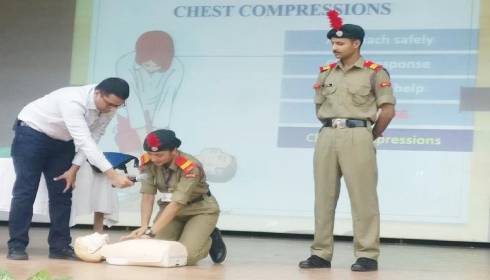
Apollo Foundation trains 1600 NCC Cadets in basic life support
DTMT Network
The Apollo Foundation, under the banner of Apollo hospitals in Hyderabad, has trained 1600 NCC Cadets in Basic Life Support (BLS). The session equipped the cadets in basic life support knowledge and skills to handle critical cases.
BLS consists of a series of medical procedures which are provided to patients in a life threatening situation. It helps to sustain life till advanced medical care comes to the person's rescue.
Cardio Pulmonary resuscitation (CPR) is a lifesaving method which is a very important part of basic life support. CPR is useful during heart attack or near drowning, in which someone's breathing or heartbeat has stopped. Thus, it is the need of the hour that every member of the community is trained in high quality basic life support.
Mrs Upasna Kamineni Konidela, Vice Chairperson – CSR, Apollo Hospitals, said, “Accidents and cardiac arrests account for the majority of emergencies, just as they often come with grave consequences. Immediate action, proper skills, and most importantly, basic life support knowledge is required to handle emergencies. In such cases, time is the greatest determinant of the fate. There is a significant lack of basic knowledge for dealing with these situations.”
According to World Health Organisation, heart disease is the world’s largest killer, claiming 17.5 million lives every year. In India, death from cardiac disease is three times that from cancer.
Dr Azharuddin, member of Apollo emergency team, said, “BLS procedure is required to be performed in the right way. There are mainly three components to be checked while performing BLS. These are circulation, airway, and breathing.”
He further said that first, the circulation of the patient needs to be checked. This is done to make sure that the heart is pumping blood properly to the organs. In some cases, chest compressions may need to be performed to ensure that blood is circulating throughout the body.
“Their airway also should be monitored for any foreign objects, sputum, or vomit to ensure that they are breathing. And lastly, breathing should be checked to make sure that the patient is getting oxygen into the lungs and vital parts of the body,” he added.